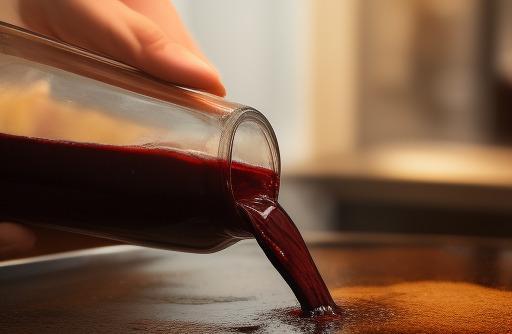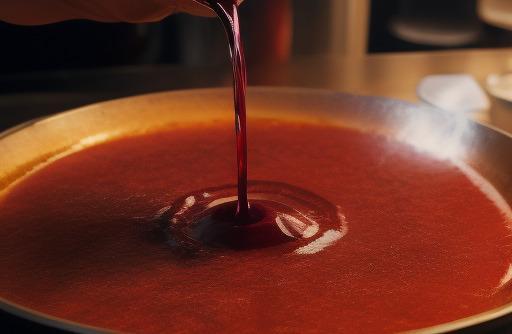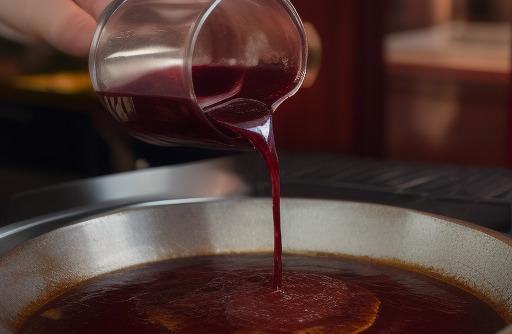Best Substitutes For Red Wine In Cooking

Red wine is a popular ingredient in many dishes, adding depth and richness to sauces, stews, and braised meats. However, there are times when you may not have red wine on hand or may prefer to avoid using alcohol in your cooking. In such cases, it is essential to have suitable substitutes that can mimic the flavors and characteristics of red wine. This article will explore the best substitutes for red wine in cooking and provide tips on choosing the right substitute for different recipes.
Key Takeaways
- Red wine adds depth and richness to dishes.
- There are several non-alcoholic substitutes for red wine in cooking.
- Vinegar, grape juice, and beef broth are among the best substitutes for red wine.
- Choosing the right substitute depends on the flavor profile you want to achieve.
Why You Need A Substitute For Red Wine In Cooking
There are several reasons why you might need a substitute for red wine in cooking:
-
Alcohol intolerance or preference: Some individuals have a low tolerance or a preference to avoid alcohol in their diet. Using a non-alcoholic substitute allows them to enjoy the flavors of red wine without the alcohol content.
-
Avoiding alcohol for health or religious reasons: Certain health conditions or religious beliefs may restrict the consumption of alcohol. Using a substitute ensures that the dish remains inclusive and suitable for everyone.
-
Unavailability or insufficient quantity: You might come across a situation where you run out of red wine or do not have enough to complete a recipe. Having suitable substitutes on hand ensures that you can continue cooking without compromising on flavor.
-
Budget constraints: Red wine can be expensive, especially if you need a large quantity for a recipe. Opting for a substitute can be a cost-effective solution without compromising the taste of your dish.
Types Of Substitutes For Red Wine In Cooking

When choosing a substitute for red wine in cooking, it is important to consider the characteristics and flavors that red wine adds to a dish. The ideal substitute should provide similar acidity, richness, and depth of flavor. Here are some common types of substitutes:
-
Non-alcoholic substitutes: These substitutes mimic the flavor of red wine without the alcohol content. They are suitable for individuals who need to avoid alcohol but still want to enjoy the flavors of red wine. Examples include grape juice, pomegranate juice, and cranberry juice.
-
Acidic substitutes: Acidic ingredients can provide the necessary acidity that red wine brings to a recipe. They also add brightness and tanginess to dishes. Lemon juice, lime juice, and vinegar are commonly used acidic substitutes.
-
Broths: Beef or vegetable broth can replace red wine in certain recipes, particularly in dishes that rely on the rich, umami flavor of wine. Adding broth provides depth and savory notes to the dish.
-
Other alcoholic substitutes: If alcohol content is not an issue, you can use other alcoholic beverages to replace red wine. Options like red grape juice, port wine, or non-alcoholic red wine can add a similar flavor profile to your recipes.
Best Substitutes For Red Wine In Cooking
-
Vinegar: Red wine vinegar is an excellent substitute for red wine in cooking. It provides the necessary acidity and tanginess that red wine imparts to a dish. Start with a small amount and adjust to taste. Other vinegars such as balsamic or apple cider vinegar can also work, but they will slightly alter the flavor profile of the dish.
-
Grape juice: Grape juice, specifically red grape juice, is a non-alcoholic substitute that closely resembles the fruity flavors of red wine. It provides sweetness and depth to sauces and braised dishes. Use it in equal amounts to replace red wine.
-
Beef broth: Beef broth is an ideal substitute for red wine in recipes that need the rich umami flavors and depth of a red wine reduction. It complements beef dishes exceptionally well. Choose a low-sodium broth or make your own to control the saltiness of the final dish.
-
Pomegranate juice: Pomegranate juice offers a unique and tart flavor profile that can approximate the complexity of red wine. It adds a touch of sweetness and acidity to savory dishes. Use it in moderation as a substitute in sauces and stews.
-
Cranberry juice: Cranberry juice can be used as a substitute for red wine in sweet and tangy recipes. It adds a bright, fruity flavor to marinades, glazes, and sauces. Adjust the quantities to balance the tartness of the cranberry juice.
-
Non-alcoholic red wine: If alcohol content is not a concern, non-alcoholic red wine is an excellent substitute. It closely resembles the flavors and characteristics of traditional red wine without the alcohol content. Use it in equal amounts to replace red wine in recipes.
It’s important to note that the choice of substitute depends on the specific recipe and the flavor profile you want to achieve. Experimentation is key to finding the perfect substitute for your desired dish.
Pro Tip: When using a substitute for red wine, start with a smaller quantity and adjust gradually according to your taste preferences. Too much of a substitute can overpower the flavors of the dish.
Choosing The Right Substitute For Red Wine In Cooking

Choosing the right substitute for red wine depends on the flavors you want to enhance in your dish. Here are some guidelines to help you make the best choice:
-
Consider acidity: If the recipe calls for red wine to provide acidity, opt for an acidic substitute like vinegar or citrus juice. These substitutes will maintain the necessary tartness and tanginess in the dish.
-
Think about sweetness: Red wine often adds a touch of sweetness to a recipe. If sweetness is a key component, grape juice, pomegranate juice, or cranberry juice can provide the desired sweetness. Adjust the quantities to balance the sweetness with other flavors.
-
Match flavors: Consider the flavor profile of the dish and choose a substitute that complements the other ingredients. For savory dishes like stews and braised meats, beef broth can provide the umami flavor that red wine offers. Non-alcoholic red wine is a suitable substitute when you want to replicate the complex flavors and characteristics of traditional red wine.
-
Experiment: Cooking is all about experimentation, so don’t be afraid to try different substitutes and find what works best for you. Take note of the flavors and adjust the quantities as needed to achieve the desired taste.
Cooking With Substitutes For Red Wine In Cooking
When cooking with substitutes for red wine, there are a few techniques you can utilize to ensure the best results:
-
Deglaze the pan: If a recipe calls for deglazing the pan with red wine, use a suitable substitute instead. This technique helps to scrape up the flavorful browned bits from the bottom of the pan and incorporate them into the dish. The substitute will provide a similar effect, enhancing the depth and richness of the dish.
-
Adjust seasonings: Since substitutes may have different flavors and characteristics, it’s important to taste and adjust the seasonings accordingly. Add herbs, spices, and other seasonings to balance the flavors and enhance the dish.
-
Simmer longer: Red wine adds depth and richness to sauces and stews, which can be achieved by simmering the dish for a longer period. When using a substitute, allow the dish to simmer for a bit longer to develop the flavors and create a similar richness.
-
Combine multiple substitutes: In some cases, using a combination of substitutes can help mimic the characteristics of red wine more effectively. For example, adding vinegar and grape juice together can provide both acidity and fruity flavors.
Recipes Using Substitutes For Red Wine In Cooking

Here are a few recipe ideas where you can use substitutes for red wine:
-
Beef Stew with Beef Broth Substitute:
- In a large pot, heat some oil and sauté onions and garlic until softened.
- Add beef cubes and brown them on all sides.
- Pour in a mixture of beef broth and tomato paste, using equal amounts to replace the red wine in the recipe.
- Add vegetables like carrots, potatoes, and celery.
- Simmer the stew over low heat until the meat is tender and the flavors have melded together.
- Season with herbs, salt, and pepper to taste.
-
Balsamic Glazed Chicken with Vinegar Substitute:
- Marinate chicken pieces in a mixture of balsamic vinegar, honey, and soy sauce.
- Preheat a skillet and sear the chicken until browned on all sides.
- Remove the chicken from the skillet and set aside.
- In the same skillet, add onions and cook until softened.
- Add a substitute for red wine by deglazing the pan with an equal amount of vinegar.
- Stir in some chicken broth and bring to a simmer.
- Add the chicken back to the skillet and cook until it is cooked through and glazed with the sauce.
-
Mushroom Risotto with Non-Alcoholic Red Wine Substitute:
- In a large saucepan, heat butter and olive oil.
- Add chopped onions and garlic and cook until softened.
- Add Arborio rice and stir to coat in the butter mixture.
- Deglaze the pan with an equal amount of non-alcoholic red wine substitute and cook until absorbed.
- Gradually add vegetable broth, stirring constantly until it is absorbed before adding more.
- Stir in sautéed mushrooms and continue cooking and stirring until the rice is creamy and tender.
- Season with salt, pepper, and grated Parmesan cheese.
Storage And Shelf Life Of Substitutes
When using substitutes for red wine in cooking, it’s important to consider their storage and shelf life:
-
Vinegar: Vinegar has a long shelf life and can be stored at room temperature in a cool, dark place. Check the expiration date or look for signs of spoilage such as cloudiness or an unpleasant odor before using.
-
Grape juice: Store grape juice in the refrigerator after opening and consume it within a week. Look for varieties without added sugar for a more authentic flavor.
-
Beef broth: If using store-bought beef broth, follow the instructions on the packaging for storage guidelines. Homemade beef broth can be stored in the refrigerator for up to 4 days or frozen for several months.
-
Pomegranate juice: Store pomegranate juice in the refrigerator and consume it within a week after opening. Look for varieties without added sugar to maintain the integrity of the dish.
-
Cranberry juice: Similar to pomegranate juice, cranberry juice should be stored in the refrigerator and consumed within a week after opening. Consider choosing unsweetened varieties to control the sweetness in your dish.
-
Non-alcoholic red wine: Non-alcoholic red wine can be stored in the refrigerator after opening and consumed within a week. Look for varieties that closely resemble the flavors of traditional red wine.
It’s important to note that the flavors of some substitutes may change over time, so it’s best to use them within their recommended shelf life.
Conclusion
Having suitable substitutes for red wine in cooking allows you to cater to various dietary preferences or restrictions without compromising the flavors of your dishes. Vinegar, grape juice, beef broth, pomegranate juice, cranberry juice, and non-alcoholic red wine are excellent alternatives that can effectively mimic the depth, richness, and acidity of red wine. Experimentation and adjusting seasonings are key to using these substitutes successfully. With these options in hand, you can confidently prepare delicious dishes that will satisfy even the most discerning palate.
FAQS
What Are Some Good Substitutes For Red Wine In Cooking?
There are several options depending on the recipe and desired flavor. For hearty dishes like stews and braises, beef stock or tomato juice can be used as a substitute. For a slightly sweeter taste, pomegranate or cranberry juice can be used. If you prefer a non-alcoholic option, grape juice mixed with vinegar or lemon juice can work as a substitute.
What Is The Best Substitute For Red Wine In A Tomato-based Pasta Sauce?
Balsamic vinegar or red wine vinegar can add a similar depth of flavor to red wine in tomato-based sauces. Beef or chicken broth can also be used to add a hearty taste to the sauce.
Can I Use White Wine As A Substitute For Red Wine In Cooking?
While it may not provide the same depth of flavor, white wine can be used as a substitute for red wine in some recipes, such as fish dishes or lighter sauces. However, it’s important to note that the flavor profile will be different.
What Can I Substitute For Red Wine In A Marinade?
A combination of beef or chicken broth, balsamic vinegar, soy sauce, and Worcestershire sauce can be used as a substitute for red wine in a marinade. Red wine vinegar can also provide a similar taste.
Can Sparkling Grape Juice Be Used As A Substitute For Red Wine In Cooking?
Sparkling grape juice can work as a substitute for red wine in certain recipes, particularly those that call for a splash of wine for taste, rather than a main ingredient. It’s important to note that the taste and texture will differ from a traditional red wine substitute.
Sources
About the Author Jenny
I'm Jenny, a housewife with an unwavering passion for food. My culinary journey began with my grandmother's kitchen, and it's now a full-fledged food blog. I've turned my love for cooking into a creative outlet, sharing recipes and stories with a global community of fellow food enthusiasts. It's proof that being a housewife can also mean pursuing your passions and savoring life's delectable moments.
